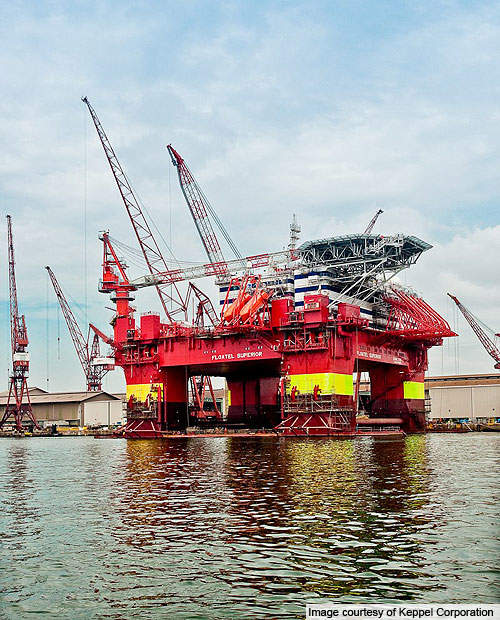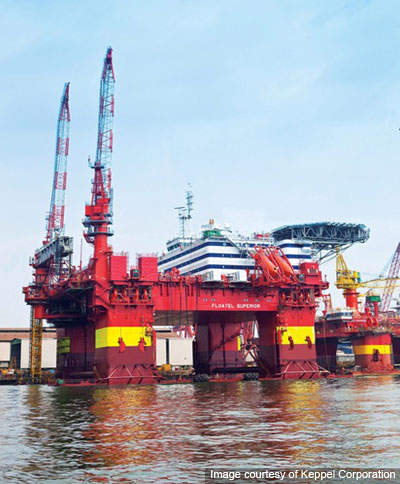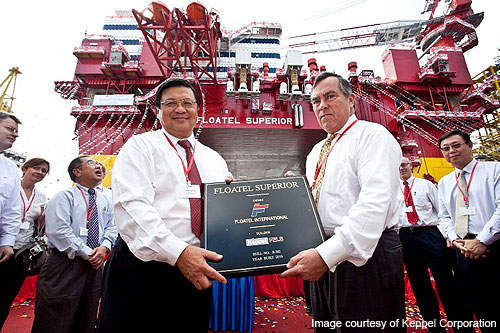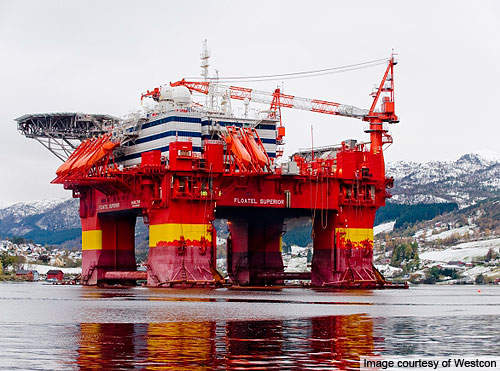Floatel Superior is a DNV-classified semi-submersible accommodation and construction support vessel. Owned by Floatel Corporation, the vessel has been built to operate in harsh environmental conditions such as those encountered in the North Sea. The facility can also be operated in tropical waters.
The vessel’s first charter contract was with ConocoPhillips Australia at its Bayu Undan field in the Timor Sea for a period of three months. Floatel signed a contract with Talisman to operate the vessel at the Yme field, but the contract was later cancelled.
Statoil contracted the vessel in August 2010 for a period of five months, which was extended to 19 months in January 2011. The vessel was contracted to operate at Statoil’s Oseberg field and gangway connected to the Oseberg B platform. Additional options to extend the vessel’s stay to 2012 and 2013 are also included in the contract.
Floatel design features
The facility was built based on the DSS20NS-DP3 design developed by GustoMSC and Keppel FELS’ Deepwater Technology Group. The design was developed by combining the design of Keppel’s SSAUTM 3600 accommodation semi-submersibles and DSSTM series semi-submersible drilling rig.
Overall length of the facility is 94m (308.4ft) and width is 91m (298.5ft). The main deck is 64.5m (211.6ft) wide and has an area of 2,200m². The vessel features dynamic positioning 3 (DP3) and an eight point mooring system.
Construction processes
Floatel Superior was constructed by Keppel at its Singapore shipyard. The pontoons were built by Keppel Batangas in the Philippines. They were transported to Singapore in January 2009 and erected.
Bracing and erection of the remaining sections of the pontoons was carried in February 2009. The centre and aft middle sections of the vessel were built in Thailand.
The last block of the facility was installed in May 2009. The living quarters block was installed in August 2009. After completion of sea trials and final commissioning works, the vessel was delivered to Floatel on 18 March 2010.
In October 2010, the vessel arrived at the westcon’s shipyard in Ølensvåg, Norway, for the installation of additional equipment, extension of the gangway and other works.
Floatel accommodation facilities
The facility features 440 air-conditioned cabins which can accommodate 440 people in a single bed configuration or 512 persons in double bed configuration. The number of beds can be increased to 600. Each cabin features a private bathroom, telephone, internet and television.
The galley and mess can accommodate 220 persons in single seating configuration. Recreation facilities include cinema / meeting room, internet café, games room, gymnasium and sauna.
Two cranes are provided to move goods and materials to nearby installations. One crane has a lifting capacity of 50mt and the other has a lifting capacity of 15mt. A 38.5m telescopic gangway bridge enables the vessel to be connected to installations even in harsh weather conditions.
It also helps in the safe transfer of personnel to the installations.
A 10m high aluminium stair tower provides access from the gangway to the main deck. The tower is one of the main emergency exits and includes stairs, walkways and landing platform.
Client offices featuring communication facilities are available on the main deck. A fully equipped hospital is located on the third deck with quick access to the heli-deck. Elevators are available for access to all the decks.
Propulsion
The vessel is powered by six 3,200KW Azimuth thrusters.
Key contractors
Keppel FELS was awarded a $305m contract for building the vessel. GustoMSC provided the design and Det Norske Veritas Approval the services.
Aluminium Offshore supplied the aluminium stair tower for the facility. The living quarter block was constructed by Bintan Offshore Fabricators in Bintan, Indonesia.
Norway’s Norsafe supplied the free fall lifeboats. Almaco was contracted to carry out engineering and installation of the accommodation facilities and the food handling equipment for the vessel.
Marine Aluminium Karmøy was awarded the contract to supply several modules including two coffee bars. Mollier was contracted to supply HVAC systems for the vessel.







